Post by dookorama on Jan 11, 2006 13:20:53 GMT -5
Ferret First Aid Kits
Emergencies and accidents can and do happen. The most important thing during an emergency besides keeping calm is being prepared. It is good to have a first aid kit prepared for your ferrets so when an accident occurs you have everything you need on hand so that you can react faster. I keep my medical supplies in a handy art/tool box and a hanging organizer so everything is organized and easy to find when I need it most. I also keep a very detailed file on each of my ferrets including information on any medications ever administered and dates, vaccines and dates, any previous illnesses, monthly weights and for my rescues any info passed on by the shelter. I also include in my kit a veterinary/infant scale so I can keep track of weights and am able to catch an illness much faster. Here is a checklist for the contense of my medical kit. Items with an asterix next to them are considered important for a basic first aid kit.
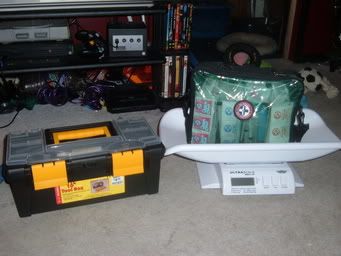
*Pedialyte (unflavored clear kind preferred)
ensure (for sick babies do not use with an insulinomic ferret!)
*couple cans of perscription A/D (you can buy these at your vet's office)
*baby food (chicken and gravy)
*feeding syringes ( I keep several sizes on hand)
*medication syringes ( again I keep a variety of sizes on hand from 1cc to 3 cc)
I.V. bag full of saline (for sub Q shots - do not use if you do not have experience with giving shots to a ferret)
Hyperdermic needles (also for subQ shots - again do not use without knowledge)
1 Vial of epinephrine (you never can be too cautious- this is a big do not use without knowledge of dosages and procedures (for allergic reactions like seen with distemper shots))
*gauze wraps
*non stick gauze pads
veterinary wrap (that stretchy colorful wrap)
*popsicle sticks (for splints)
*kaolin vetrinary formula (kaopectate)
*Pepto bismol
*scissors (I prefer medical saftey scissors with rounded tips)
*Lax (any hairball remedy like ferret lax, vaseline or canola oil)
rubber tourniquet
medical clamps (hemastats)
*chemical ice packs
*wash cloths
*styptic powder
*antibacterial ointment
*betadine
*karo syrup
*thermometer
*heat pack
*q-tips
*cotton balls
*clean baby blankets (for wrapping up a scared fuzz)
*eye dropper
empty liquid medicine bottles (I use these if I need to store a medication suspension from a crushed pill like sucralfate)
A small bottle of tone ( to calm the patient)
*Veterinary eyewash
a can of colustrum (milk replacer)
*a tube of desitin ( for bum rashes)
*a tube of preperation H (if a prolapse occurs)
*Small pieces of wood (This is for just in case a fuzzy should fall or hurt their spine so I can immobilize them for the trip to the vet) --Thank god I have never needed it yet!!!!
* medical tape
*antiseptic wipes
* alcohol prep wipes
*tweezers
* latex gloves
*Ziplock baggies for fecal samples
* pepcid ac tablets
* pill crusher and spliter
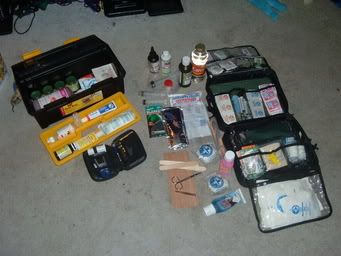
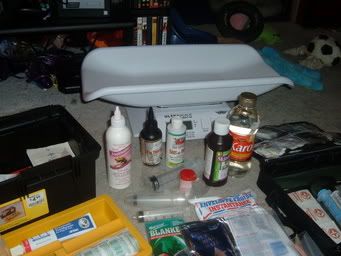
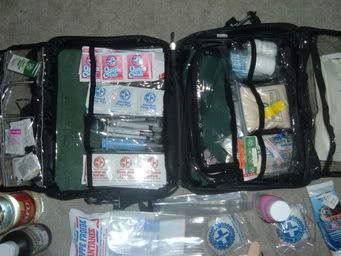
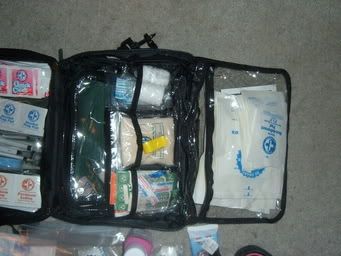
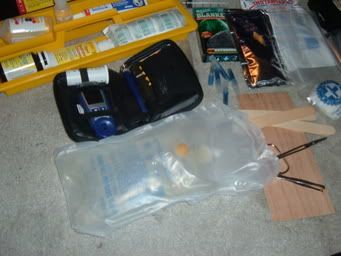
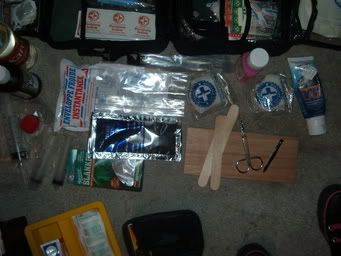
The most important items: A clear mind and a deep breath. Also always remember the medical credo "Primum non nocere" or "first do no harm".
Written by: Jennifer Morris "the dook mom"
Emergencies and accidents can and do happen. The most important thing during an emergency besides keeping calm is being prepared. It is good to have a first aid kit prepared for your ferrets so when an accident occurs you have everything you need on hand so that you can react faster. I keep my medical supplies in a handy art/tool box and a hanging organizer so everything is organized and easy to find when I need it most. I also keep a very detailed file on each of my ferrets including information on any medications ever administered and dates, vaccines and dates, any previous illnesses, monthly weights and for my rescues any info passed on by the shelter. I also include in my kit a veterinary/infant scale so I can keep track of weights and am able to catch an illness much faster. Here is a checklist for the contense of my medical kit. Items with an asterix next to them are considered important for a basic first aid kit.

*Pedialyte (unflavored clear kind preferred)
ensure (for sick babies do not use with an insulinomic ferret!)
*couple cans of perscription A/D (you can buy these at your vet's office)
*baby food (chicken and gravy)
*feeding syringes ( I keep several sizes on hand)
*medication syringes ( again I keep a variety of sizes on hand from 1cc to 3 cc)
I.V. bag full of saline (for sub Q shots - do not use if you do not have experience with giving shots to a ferret)
Hyperdermic needles (also for subQ shots - again do not use without knowledge)
1 Vial of epinephrine (you never can be too cautious- this is a big do not use without knowledge of dosages and procedures (for allergic reactions like seen with distemper shots))
*gauze wraps
*non stick gauze pads
veterinary wrap (that stretchy colorful wrap)
*popsicle sticks (for splints)
*kaolin vetrinary formula (kaopectate)
*Pepto bismol
*scissors (I prefer medical saftey scissors with rounded tips)
*Lax (any hairball remedy like ferret lax, vaseline or canola oil)
rubber tourniquet
medical clamps (hemastats)
*chemical ice packs
*wash cloths
*styptic powder
*antibacterial ointment
*betadine
*karo syrup
*thermometer
*heat pack
*q-tips
*cotton balls
*clean baby blankets (for wrapping up a scared fuzz)
*eye dropper
empty liquid medicine bottles (I use these if I need to store a medication suspension from a crushed pill like sucralfate)
A small bottle of tone ( to calm the patient)
*Veterinary eyewash
a can of colustrum (milk replacer)
*a tube of desitin ( for bum rashes)
*a tube of preperation H (if a prolapse occurs)
*Small pieces of wood (This is for just in case a fuzzy should fall or hurt their spine so I can immobilize them for the trip to the vet) --Thank god I have never needed it yet!!!!
* medical tape
*antiseptic wipes
* alcohol prep wipes
*tweezers
* latex gloves
*Ziplock baggies for fecal samples
* pepcid ac tablets
* pill crusher and spliter






The most important items: A clear mind and a deep breath. Also always remember the medical credo "Primum non nocere" or "first do no harm".
Written by: Jennifer Morris "the dook mom"
 all my kids are doing well otter is getting real beefy feeling <winter weight?> and his coat is getting real soft not many noticeable changes overall,, new guy is getting big
all my kids are doing well otter is getting real beefy feeling <winter weight?> and his coat is getting real soft not many noticeable changes overall,, new guy is getting big Daxy is SO happy the weather is cooling off! He doesn't like the AC - it limits him to one room but when I let him go other places, he just flat ferrets cause it's too hote
Daxy is SO happy the weather is cooling off! He doesn't like the AC - it limits him to one room but when I let him go other places, he just flat ferrets cause it's too hote